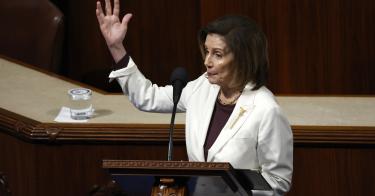Congress must make an important decision. Soon.
Unable to agree on fiscal 2023 appropriations, lawmakers earlier approved a Continuing Resolution (CR) funding the government at 2022 levels. That temporary spending bill will expire Dec. 16. Congress must decide whether to extend the CR into next year or pass a full-year omnibus funding bill instead. The latter would be a tragic mistake.
The far better option is to pass a clean CR and leave it to the newly elected Congress to craft spending in a way that reflects the will of the people and starts to restore fiscal sanity to Washington.
The newly elected House is likely to be more fiscally conservative. The lame ducks of the current Congress should not shove even more reckless spending down taxpayers’ throats as they limp off into the sunset. If House Speaker Nancy Pelosi keeps her promise, an omnibus would seriously aggravate the stagflation currently assaulting the nation.
>>> Republicans Must Fight Biden’s Trillion-Dollar Spending by Refusing To Give In on Debt Limit
Mrs. Pelosi has promised spending bills that would float an army of 87,000 additional IRS agents, leave our southern border open and lawless, fund abortions, promote Critical Race Theory and bankroll job-killing green energy programs.
On the other hand, a clean extension of current funding levels would reduce inflationary pressures, calm fears of a debt crisis and maintain protections against further misuse of taxpayer dollars.
Though well-connected special interests will undoubtedly call for an omnibus, remember that each dollar of increased discretionary spending increases 10-year projected deficits by $12.80. Mrs. Pelosi’s offer for an omnibus would likely increase inflationary deficits by more than $1.3 trillion over the next decade.
Before Congress considers the speaker’s proposal, they should insist she explain why the inflation tax is now $4,200 per worker, why energy prices are up more than 40% since President Biden took office, and why mortgage rates have more than doubled in less than a year. If she’s honest, she will say that Congress itself made all these problems worse.
Since the start of the pandemic, Congress has written checks totaling $7.5 trillion that were financed through more debt and the Fed printing money like there’s no tomorrow.
Far from supporting the economy, the government competed against it. Government spending didn’t magically produce $7.5 trillion worth of tangible goods and services. Reckless money printing and borrowing triggered the rampant inflation that drained the value from your savings, investments and paychecks.
Profligate government borrowing and spending have spawned a 130% increase in average mortgage rates since December 2021. That adds up to an additional $323,000 in interest payments over the life of the median mortgage.
However, the economic calamity of this spending spree isn’t limited to housing. It’s led to a crippling inflation tax of more than $13,000 per household since the pandemic began, a contracting economy, shortages of essential products, and trillions of dollars of retirement savings evaporating.
>>> A Dynamic Score of the Proposals in the Budget Blueprint for Fiscal Year 2023
Worse still, an omnibus bill would likely circumvent the fiscally responsible Obama-era PAYGO law, which would require Congress to trim $130 billion from current spending levels because lawmakers failed to adequately offset the excessive costs of Mr. Biden’s ironically-named Inflation Reduction Act.
Ensuring that this cut happens would be a good start toward restoring fiscal sanity. On the other hand, waiving the PAYGO standards would only intensify concerns over our debt—currently on track to again exceed the statutory limit in a matter of months.
Casually increasing the deficit, waiving PAYGO cuts, and recklessly increasing, suspending, or even repealing the debt limit would signal to international markets that the U.S. is indeed hurtling toward a debt crisis.
The American people are looking for a responsible and respectful government, not more federally-induced economic catastrophes. A clean, short-term CR in December would signal that Washington is ready to reverse course—to forge a path to prosperity instead of a future of ruin built of political expediency.
This piece originally appeared in The Washington Times



